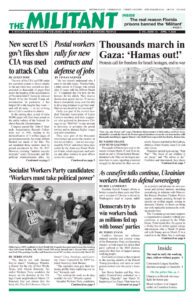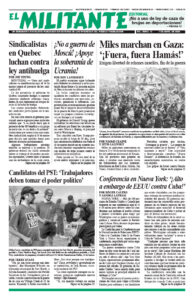The Militant won an important victory in the fight for prisoners’ constitutional rights to follow the news and read papers with the viewpoint they support, as well as the freedom of the press, when the Florida Department of Corrections Literature Review Committee overturned the impoundment of Militant issue no. 2 at its March 6 meeting. The victory was a product of the actions of supporters of political rights and the Militant. The LRC informed Militant attorney David Goldstein of its decision March 19.
But throughout the two-month fight, the Militant never received the notice of impoundment from authorities at the prison that banned the Militant, nor their reasons for doing so — until after the ban was lifted.
The Militant first learned about the impoundment when two subscribers to the paper at the Santa Rosa Correctional Institution in Milton, Florida, notified the Militant in February that prison authorities there had banned that issue. They each mailed the Militant copies of the impoundment notice they were given.
This notice said the ban was imposed in Santa Rosa because “another institution” — which was not identified — “believes the publication contains subject matter that is inadmissible.” Florida Department of Corrections policy is when one prison bars a publication, it is impounded at all of the state’s 134 facilities.
The notice cited only one reason for the ban, a generic catchall charge that the paper “presents a threat to the security, order or rehabilitative objectives of the correctional system or the safety of any person.” Authorities pointed to two articles as the criteria for impoundment — a front-page article “Israel fights for right to exist as a refuge from Jew-hatred,” and one on page 7, “Jew-hatred, ‘racial purity’ at heart of Hamas program.”
On March 20, after learning the ban had been overturned, Goldstein requested the Literature Review Committee provide the Militant with a copy of the impoundment notice from the prison that actually first banned it. It was sent the same day.
This original impoundment notice came from the Florida State Prison in Raiford, one of the largest prison facilities in the state and home to the state’s execution chamber. Unlike the notice from Santa Rosa, this one shows authorities there claimed that issue no. 2 “is dangerously inflammatory in that it advocates or encourages riot, insurrection, rebellion, organized prison protest, disruption of the institution, or the violation of the federal law, state law, or Department rules.”
Neither officials at the Literature Review Committee nor at Florida State Prison had provided this broad sweep of charges to Goldstein as he was preparing the Militant’s appeal of the ban, so he wasn’t able to address them, a clear violation of constitutional rights and procedures.
There are 13 Militant subscribers at Florida State Prison and over 100 at prison facilities throughout the state. The Literature Review Committee says each of them will now be able to get this issue of the paper.
This victory was won thanks to the efforts of numerous groups and individuals, including the Florida Press Association, American Civil Liberties Union of Florida, Amnesty International USA, unionists and others across the country who joined in urging prison authorities to reverse the ban.

